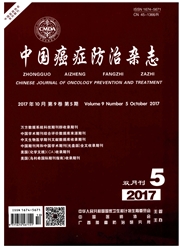

 中文摘要:
中文摘要:
目的 探讨子宫颈癌根治术后患者远期膀胱功能障碍的发生率及影响膀胱功能恢复的相关因素。方法 选择2013年6月至2014年7月在广西某三级甲等肿瘤专科医院行腹腔镜下子宫颈癌根治术的患者234例,采用问卷法和电话随访调查患者术后远期膀胱功能情况。结果 发生不同程度的膀胱功能障碍67例(30.45%);影响患者远期膀胱功能恢复的独立影响因素为文化程度、家庭经济水平和膀胱功能锻炼程度。结论 子宫颈癌根治术后患者远期膀胱功能障碍发生率较高,护理人员应针对相关影响因素进行干预,加强延续护理,提高患者生活质量。
 英文摘要:
英文摘要:
Objective To analyze incidence of, and factors associated with,long-term bladder dysfunction in patients with cervical cancer after radical hysterectomy. Method A total of 234 patients who underwent laparoscopic cervical cancer radical prostatectomy from June 2013 to September 2014 were followed up by telephone to investigate long-term bladder function. Results Bladder dysfunction was present, to differing degrees, in 67 patients( 30.45% ). Primary factors associated with dysfunction were education level, family income, and extent of bladder function exercise. Conclusions Long-term bladder dysfunction is prevalent among patients with cervical cancer after radical hysterectomy. Nursing staff should strengthen continuous interventions targeting factors affecting bladder function in order to improve patient quality of life.
 同期刊论文项目
同期刊论文项目
 同项目期刊论文
同项目期刊论文
 期刊信息
期刊信息
